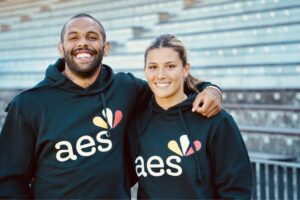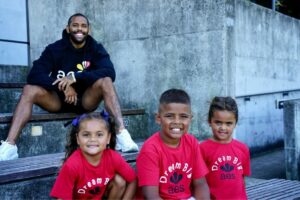Starting the year off strong, the Aboriginal Employment Strategy (AES) celebrated their 25 years in operation, kicking off as major sponsors of the NRL Indigenous All Stars game.
Proud Murri and South Sea Islander woman and CEO of Aboriginal Employment Strategy, Kristy Masella said it was about celebrating the success of working together.
“We are so proud. It is not only an achievement for us as an organization, but a reflection of the partnership approach that has gotten us to this point. Working in collaboration with community and employers to create career opportunities. That’s at the heart of what we do at AES, and as a result we are deadly, together,” Kristy said.

The AES works with more than 550 employers across Australia each year to create career opportunities for Aboriginal and Torres Strait Islander Australians. 16 regionally based offices across four states and territories, work locally to support more than 1,150 career opportunities each year.
Part of the approach is working with the employer to support cultural competency and understanding, and helping individuals develop skills and capabilities they need for career success.
“Our employers are key. They come to us with a willingness to do better, be better. They walk with us to better their organisation in terms of cultural capability and understanding, inclusiveness and building respectful connections to local communities – with the ultimate aim of creating a culturally safe workplace for our people,” said Kristy.
“But the ultimate outcome is driven by mob. It’s the resilience and strength of the individual, that desire to support their family, community and be proud in what they have achieved through their job and ultimately their career. That’s what makes AES so special, we are all working together to support Aboriginal and Torres Strait Islander people to succeed. The AES approach is strengths based – it’s a key difference in our approach to supporting better employment outcomes – and as a result, we are standing the test of time, growing stronger each year.”

The proof of success is seen in many ways – 25,000 career placements since establishment plus 2,500 traineeships and apprenticeships. Further, 85% of Indigenous candidates placed by the AES remain in employment long term.
Kristy credits this to the AES mission to drive change across sectors and place people in careers that interest them rather than define them.
“We don’t put any restrictions about the type of work people are interested in. As a result, we see huge growth in a diverse range of sectors. Over recent years, we’ve seen a lot of success in Aboriginal women gaining careers in the construction industry for example. A typically male dominated industry that is now a sector of choice for many women, given the opportunity are achieving huge success,” Kristy said.
The AES supports people of all ages, from 16 to 76-year-olds represented in their client cohort.
In recent years, the organisation has expanded to support more careers in Australia’s largest employers including government agencies and kickstarting career pathways across every industry and sector and at every level.
AES was established on Gomeroi/Kamilaroi country in response to low unemployment of Aboriginal people in the regional northern NSW community of Moree.
Today, the AES operates in 16 regional offices, is a 100 per cent Indigenous managed and Supply Nation Registered Charity. 95% of AES staff are First Nations, representing more than 140 Aboriginal and Torres Strait Islander language/clan groups nationally. Aboriginal women make up a significant portion of AES senior management.
The AES also operates a successful Art Gallery, Yaama Ganu, supporting economic participation in regional and remote Aboriginal communities and careers in curating, gallery management and hospitality.
Café Gali, in Moree is also run by AES, providing employment, experience and training for local Aboriginal people in hospitality and customer service.
Lourdes Antenor is an experienced writer who specialises in the not-for-profit sector and its affiliations. She is the content producer for Third Sector News, an online knowledge-based platform for and about the Australian NFP sector.
- Lourdes Antenorhttps://thirdsector.com.au/author/lourdes-antenor/
- Lourdes Antenorhttps://thirdsector.com.au/author/lourdes-antenor/
- Lourdes Antenorhttps://thirdsector.com.au/author/lourdes-antenor/
- Lourdes Antenorhttps://thirdsector.com.au/author/lourdes-antenor/











